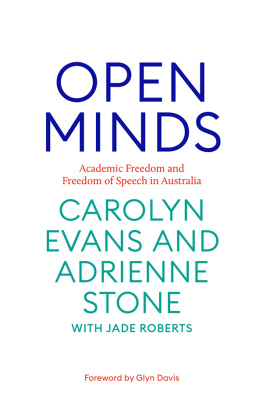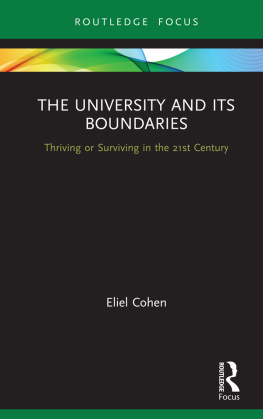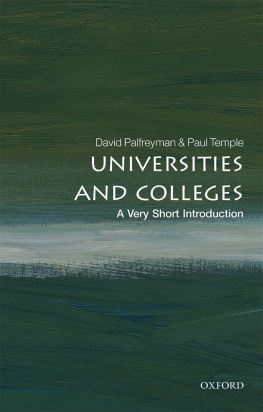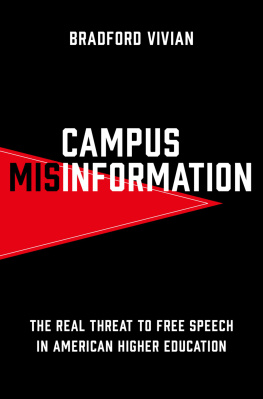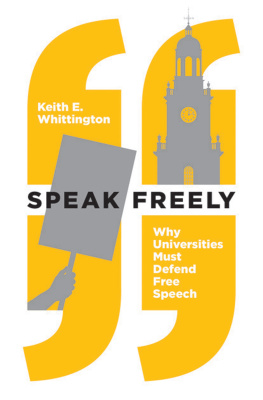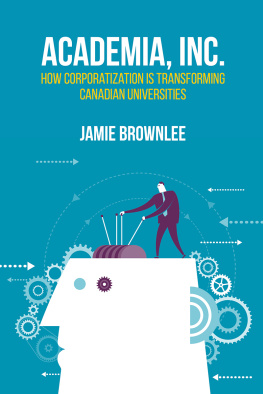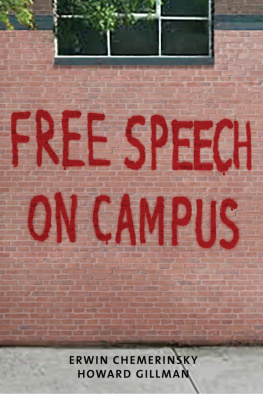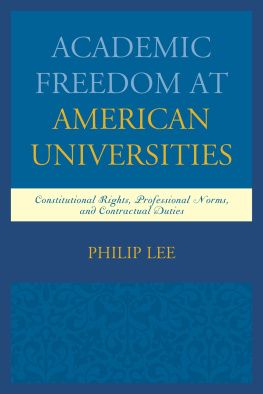Published by La Trobe University Press in conjunction with Black Inc.
Level 1, 221 Drummond Street
Carlton VIC 3053, Australia
www.blackincbooks.com
www.latrobeuniversitypress.com.au
La Trobe University plays an integral role in Australias public intellectual life, and is recognised globally for its research excellence and commitment to ideas and debate.
La Trobe University Press publishes books of high intellectual quality, aimed at general readers. Titles range across the humanities and sciences, and are written by distinguished and innovative scholars. La Trobe University Press books are produced in conjunction with Black Inc., an independent Australian publishing house. The members of the LTUP Editorial Board are Vice-Chancellors Fellows Emeritus Professor Robert Manne and Dr Elizabeth Finkel, and Morry Schwartz and Chris Feik of Black Inc.
Copyright Carolyn Evans and Adrienne Stone 2021
Carolyn Evans and Adrienne Stone assert their right to be known as the authors of this work.
ALL RIGHTS RESERVED.
No part of this publication may be reproduced, stored in a retrieval system, or transmitted in any form by any means electronic, mechanical, photocopying, recording or otherwise without the prior consent of the publishers.
9781760641634 (paperback)
9781743821503 (ebook)

Cover design by Akiko Chan
Text design and typesetting by Dennis Grauel
Author photos by Luke Marsden and Peter Casamento
FOREWORD
Glyn Davis
S ome books are necessary, speaking to a moment when clarity is essential.
The issues of academic freedom and free speech on campus have been a target for clashes in the United States for some time. Recently, Australia imported the controversy, only lightly retooled for local consumption. Australian universities find themselves accused of suppressing the rights of staff and students, of creating a chilling atmosphere that prevents the full flow of debate indeed, of debasing the very idea of a university.
Cue columns about Cardinal John Henry Newman and knowledge for its own sake, demands for adopting a policy statement developed for the University of Chicago and claims of substantial hostility to free speech on campus.
The chief, though by no means sole, proponent of this apparent crisis is the Institute of Public Affairs, its frequent pronouncements enthusiastically reprinted by The Australian. Pressed to act, in late 2017 education minister Dan Tehan announced the Independent Review of Freedom of Speech in Australian Higher Education Providers, to be led by former High Court chief justice and University of Western Australia chancellor Robert French.
There is irony in government deciding to investigate academic freedom. As Open Minds notes, government frequently emerges as the largest threat to such freedom. In controversies over nearly a century, politicians, police and security agencies, often in partnership with timid university administrations, are those most likely to subvert institutional autonomy and individual voices.
Nonetheless, French accepted the brief from Minister Tehan, and over several months consulted with university organisations, academics, students and the accreditation agency, first on the issues and then on a potential model code.
Like the assignment, the report findings proved somewhat contradictory. On the one hand, French found clearly and unambiguously that IPA claims of a crisis had no substantive basis. Reported incidents, he wrote, do not establish a systemic pattern of action by higher education providers or student representative bodies, adverse to freedom of speech of intellectual inquiry in the higher education sector.
Yet despite finding no case to answer, French nonetheless recommended statutory amendments, including a legislated definition of academic freedom, amended higher education standards and a model code. Such changes, he argued, would strengthen protection of academic freedom and freedom of speech.
Minister Tehan accepted the recommendations from Justice French and called on universities to act. While recognising that universities are autonomous institutions, he began, I am writing to all higher education providers to urge them to carefully consider Mr Frenchs recommendations and the adoption of the Model Code.
He would become more insistent in later media statements, criticising universities for using their autonomy. Universities, he claimed, are failing Australia by choosing not to implement a voluntary model code.
So although the independent review he commissioned found no evidence of systematic threats to academic freedom or freedom of speech on campus, and although the code was said to be a matter of institutional choice, here was the minister berating the sector for not accepting his preferred outcome.
And the Institute of Public Affairs? Though it produced no persuasive evidence of the claimed crisis in academic freedom for the inquiry, the attack on universities simply resumed.
Indeed the chair of the institute chose to ignore the key finding altogether. Responding to the French report, Janet Albrechtsen instead claimed vindication of her concerns, dismissed critics who suggested the institute was engaging in a culture war and once more censured universities for alleged failures despite a report that found just the opposite. Firmly held beliefs need brook no evidence.
Which brings us to Open Minds, a welcome alternative to endless assertions. Two of Australias leading legal scholars tackle from first principles the issues of academic freedom and free speech on campus. Professors Carolyn Evans and Adrienne Stone bring scholarly rigour to the task. Their analysis is sympathetic to the approach pursued by French, if more wide-ranging in scope. Recent controversies are cited and examined, along with responses to the French report, but the underlying reasoning proceeds from the core concepts.
By opening the study with historic examples of institutional failure to protect academic freedom, the authors prove alive to risks and realities. There are threats to take seriously. Universities do not always live up to professed values.
The cases chosen sharpen the distinction Evans and Stone draw between academic freedom, defined by one vice-chancellor as a belief in free, critical and rational inquiry, and freedom of speech on campus. The first, necessarily, is restricted to academics: an intrinsic part of the job rather than a separate right. There are, of course, arguments about limits and responsibilities, but Open Minds provides a precise delineation of academic freedom and its expression in institutional policies.
Freedom of speech, by contrast, is a general right open to students and staff alike. It is constrained by laws that apply across society, which must also operate on campus. Again, the concept is clearly outlined, along with controversies around hurtful speech and offensive speech. The authors acknowledge the gap that can arise between principle and expression in policy, particularly the challenge of writing disciplinary codes that seek to protect the collegial character of a university.
With the dual concepts of academic freedom and free speech firmly established, attention turns to threats. Once the risk was government intervention in academic appointments during the Cold War, or threats to public funding if management did not confront student protestors. The pressures now may be more subtle, but they are no less concerning. Treating students as customers can create worrying dynamics. Some foreign governments monitor activity on campus and complain loudly at any perceived insult, seeking therefore to influence curriculum. Caution is required when universities sign contracts with business for research funding or accept philanthropic grants with conditions that may undermine institutional autonomy.

